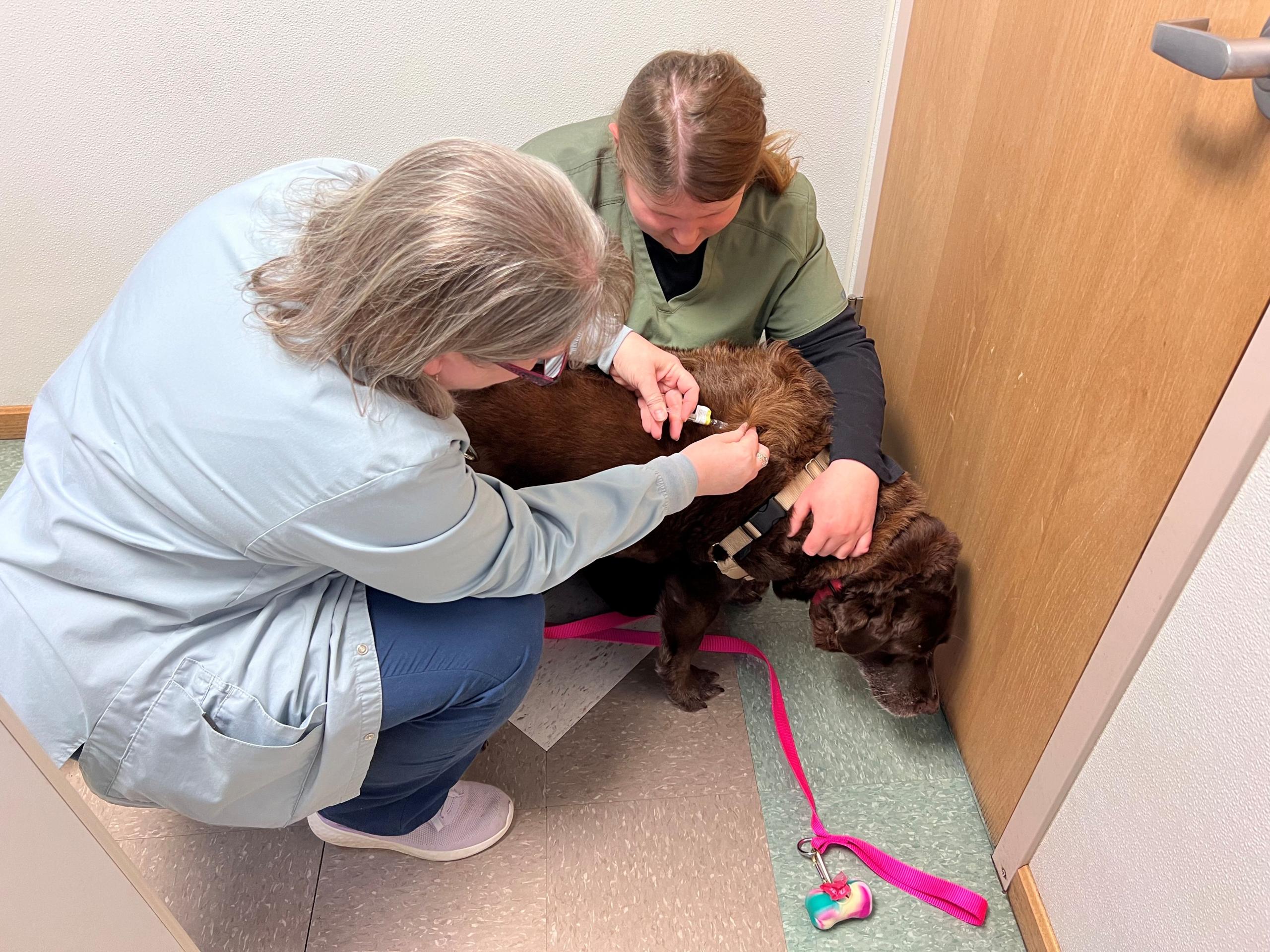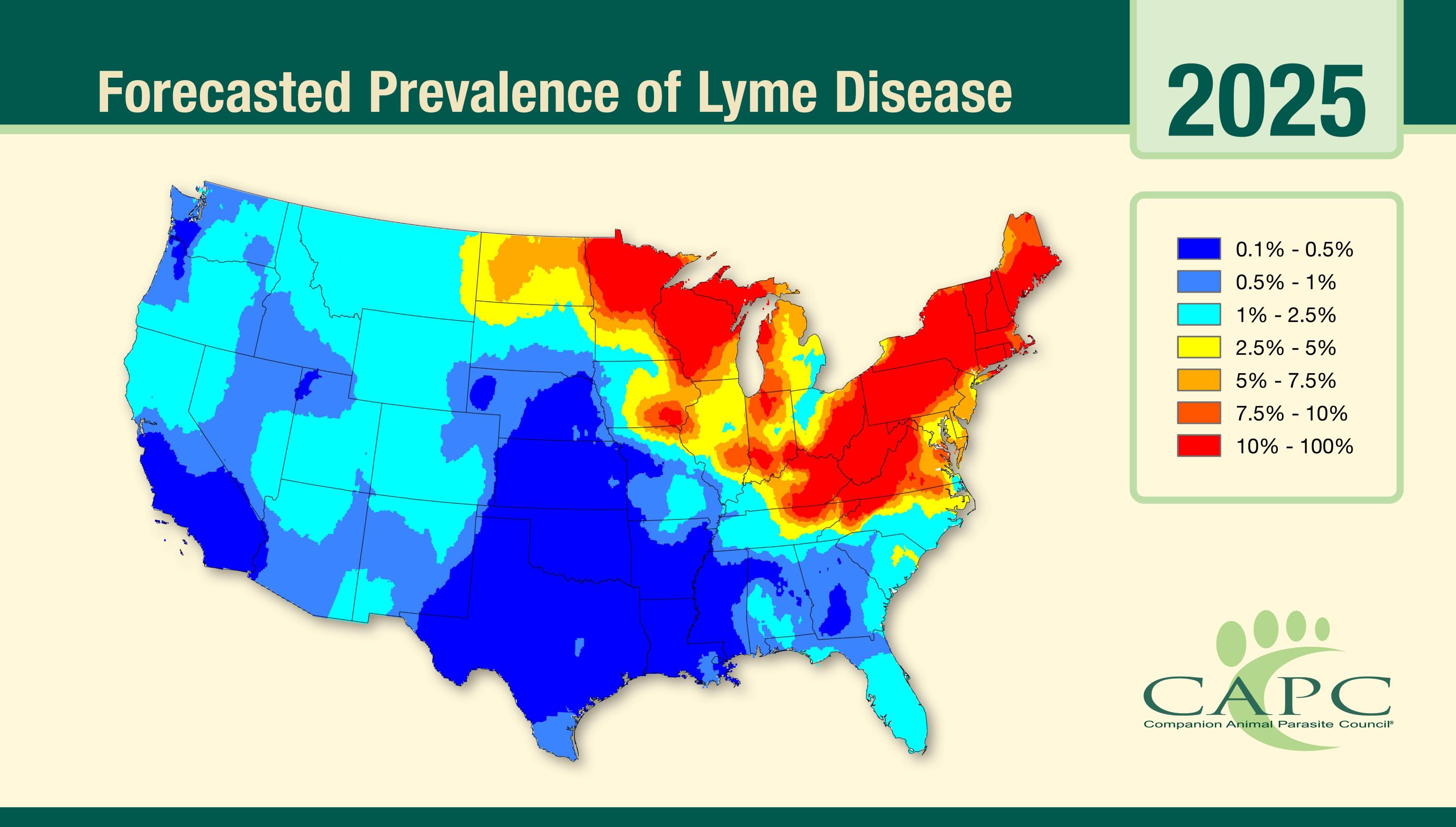 Vaccinations are the foundation to preventive healthcare for your dog. In our practice, dog vaccinations are administered at a scheduled wellness exam with a veterinarian. When appropriate, a technician may administer booster vaccines. Have questions about a puppy vaccine schedule? See our Puppy Page for more information.
Vaccinations are the foundation to preventive healthcare for your dog. In our practice, dog vaccinations are administered at a scheduled wellness exam with a veterinarian. When appropriate, a technician may administer booster vaccines. Have questions about a puppy vaccine schedule? See our Puppy Page for more information.
1. Rabies Vaccine:
The rabies vaccine we offer at our practice is valid for 1 year or 3 years depending on your dog's vaccine history. The vaccine is a killed virus vaccination. Rabies vaccinations for dogs are given by a veterinarian starting at 12 weeks of age and are required by Portage County Law. Rabies vaccines can only be administered right after your pet has been examined by a licensed veterinarian per Ohio Law. Upon vaccination, you will receive a rabies vaccine certificate attached with your receipt along with a rabies tag.
- Did you know:
- According to the Ohio Department of Health, Dogs in Ohio State Parks must wear a rabies tag as proof of rabies vaccination.
- Did you know:
- Although rabies vaccines can be purchased by non-veterinary staff in Ohio, the Ohio Department of Health considers such animals as unvaccinated when assessing a public health risk. This is why all animals who seek treatments at our practice MUST be up to date on a rabies vaccine. Legally, proof of rabies can only be given by a licensed veterinarian.
- Did you know:
- According to WHO, blood feeding bats are now the PRIMARY source of human rabies exposure in the United States. If you get a bat in your home you must contact your local health department.
Rabies is a zoonotic virus. According to the World Health Organization (WHO), Human rabies deaths are preventable with prompt post exposure prophylaxis (PEP). The goal of this treatment is to stop the virus from reaching the central nervous system. Once the virus reaches the central nervous system and clinical symptoms appear, rabies is fatal in nearly 100% of cases for humans and pets.
2. DA2PP:
This vaccine includes canine distemper virus, canine adenovirus type 1, canine adenovirus type 2, canine parainfluenza virus, canine parvovirus, and canine parvovirus type 2c. This vaccine is a modified live virus vaccination that is good for 1 year after the initial series. Subsequent vaccines are then given every 3 years.
3. Leptospirosis

This vaccine contains inactivated whole cultures of four Leptospira serovars: Leptospira canicola, L. grippotyphosa, L. icterohaemorrhagiae, and L. pomona. This vaccine is administered annually for appropriate protection.
- What is Leptospirosis?
- Leptospirosis is a bacterial zoonotic disease spread in the urine of wildlife and domesticated dogs. The bacteria can survive outside a host for weeks to months. Unvaccinated dogs are at risk for contracting this disease. Symptoms include urinary incontinence resulting in exposure of this bacteria to you and your family. According to the CDC, without treatment, leptospirosis in people can lead to kidney damage, meningitis, liver failure, trouble breathing, and death. The same can happen to your pet.
- Did you know:
- The CDC states that Leptospirosis is found world wide. About 1 million confirmed cases in people occur globally each year with nearly 60,000 deaths.
4. DA2PP / L4:
This vaccine includes canine distemper virus, canine adenovirus type 1, canine adenovirus type 2, canine parainfluenza virus, canine parvovirus, canine parvovirus type 2c, Leptospira canicola, L. grippotyphosa, L. icterohaemorrhagiae, and L. pomona. This vaccine is merely a combination of the DA2PP and L4 separated vaccines. This means one less poke for your pup!
5. Upper Respiratory Vaccines aka "Bordetella"
Upper respiratory diseases in dogs are very contagious. We want to make sure protection is maintained while not over vaccinating your dog. The vaccines we provide have virus protection found in portions of the DA2PP vaccine. In the years your pet is receiving their DA2PP / L4 vaccine, they will receive the injectable Bordetella. On the in between years where we only booster the Leptospirosis vaccine, we will administer the intranasal vaccine which boosters the Adenovirus and Parainfluenza portions along with Bordetella.
- Intranasal Vaccine: This vaccine is administered as drops in the nose. It includes canine adenovirus type 2, canine parainfluenza virus, and Bordetella bronchispetica. This vaccine is administered annually for appropriate protection.
- Intranasal vaccines will stimulate a different part of your dog's immune system giving your pet better protection when exposed to these pathogens.
- Injectable Bordetella Vaccine: This vaccine contains cellular markers to train your dog's immune system to fight Bordetella bronchispetica. This vaccine is administered annually for appropriate protection.
6. Canine Flu:
This vaccine contains killed virus for the most common canine flu strain. After an initial series of two, this vaccine is administered annually for appropriate protection.
7. Lyme Vaccine
 Our practice utilizes the crLyme vaccine to protect against the bacteria Borrellia burgdorferi. It contains not only OspA (outer surface protein A) but also 14 OspC epitopes. These 14 variations allow for broad spectrum protection against variants seen across the United States. This vaccine has data showing immunity lasting 15 months but is safely boostered annually with your pet's other core vaccinations.
Our practice utilizes the crLyme vaccine to protect against the bacteria Borrellia burgdorferi. It contains not only OspA (outer surface protein A) but also 14 OspC epitopes. These 14 variations allow for broad spectrum protection against variants seen across the United States. This vaccine has data showing immunity lasting 15 months but is safely boostered annually with your pet's other core vaccinations.
- Did you know:
- According to the Companion Animal Parasite Council, 1 in 15 dogs in Portage County test positive for Lyme disease?
- Did you know:
- You can prevent your dog from contracting Lyme Disease if you use prescription flea and tick prevention prescribed by your veterinarian along with the Lyme vaccine. Two different forms of protection form a barrier for your dog. Just like cars have both seatbelts and airbags to keep us safe!
